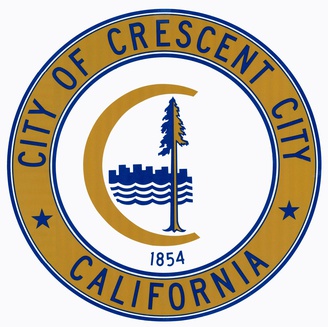Jessica Cejnar / Tuesday, March 2, 2021 @ 5:10 p.m.
Though Crescent City Stands To Gain Over $1.2 Million, Councilors Oppose Biden's $1.9 Trillion COVID-19 Stimulus Bill

It’s the first time a coronavirus relief plan included money to cities and local governments for revenue loss, but the Crescent City Council on Monday declined to support President Biden’s American Rescue Plan.
Crescent City’s cut out of $19.5 billion to “non-entitlement communities” — those with a population of less than 50,000 — is $1,277,504, City Manager Eric Wier said. But Councilors took issue with a propose $15 national minimum wage increase, funding allocations earmarked for the arts and the possibility that the overall $1.9 trillion stimulus plan would increase the national debt.
Though the League of California Cities asked them to sign onto a letter of support for the American Rescue Plan Act, Councilors declined.
“With all of the COVID-related funding that has come out of Washington DC, the one thing that has never come is anything that can help us replace lost revenue. This is the first time that’s been the case,” Councilor Blake Inscore said. “The fact that we’re called ‘non-entitlement’ sort of speaks to the very nature of how we’ve been treated in the midst of all of this.”
Approved by the U.S. House of Representatives on Saturday, the American Rescue Plan Act calls for $350 billion in COVID-19 relief for states, municipalities, counties, tribes and territories. Of that, $130 billion will be split between municipalities and counties while $65 billion will be allocated through a modified Community Development Block Grant formula, according to Wier.
Cities with a population greater than 50,000 — known as “entitlement cities,” according to the bill — will receive $45.5 billion. According to Wier, Crescent City is a non-entitlement community.
“Every city gets a piece is what this is,” he said. “There’s no deadline for spending funds and they can be used to replace lost revenues.”
According to Wier, Crescent City lost $200,000 in revenue, primarily from transiency occupancy tax due to the short-term lodging ban early in the pandemic, between March and June. Though TOT began picking up at the start of the 2020-21 fiscal year, the city did cut expenditures, he said, including keeping the Fred Endert Municipal Pool closed.
Wier also noted the pandemic is not over and the bill could help the city with future expenditures.
The American Rescue Plan Act also includes about $25 billion for rent and utility assistance; $5 billion for homeless intervention; and $10 billion for homeowner mortgage assistance. There is also $50 billion in FEMA dollars to reimburse for personal protective equipment, though Wier said he wasn’t sure exactly what that meant.
The bill provides $1,400 stimulus checks, an increase in the weekly unemployment benefit from $300 to $400 through Aug. 29 and expands the Child Tax Credit to $3,000 per child and $3,600 for children under age 6. It also allows families to claim up to half their childcare expenses on their taxes, the Washington Post reported Saturday. It also puts more than $5 billion into the Pandemic-EBT program that grants children temporary nutrition benefits.
The American Rescue Plan sets aside $130 billion for K12 education, with money going to improve ventilation systems, reducing class sizes, purchasing personal protective equipment and implementing social distancing.
The House bill would also increase the hourly minimum wage from $7.25 to $15, though the Senate’s parliamentarian said it cannot remain in the legislation, the Post reported Thursday.
On Tuesday, the Post, reported that Sen. Bernie Sanders (I-Vt.) pledges to restore the $15 minimum wage increase.
On Monday, Crescent City Mayor Jason Greenough said he was concerned that the American Rescue Plan wasn’t just a relief package, but an “omnibus type of bill.” The proposed national minimum wage increase would come with all sorts of consequences that Californians are already feeling, he said.
Spending for the arts and “spending for all sorts of different things in this bill,” seems like a lot, Greenough said.
“I was just looking at the National Debt Clock — not a lot of people like to look at it ‘cause it hits you pretty hard — it’s at $27 trillion. That’s more than we spent fighting World War II,” Greenough said. “I’m going to acknowledge we do have needs as a city, but it just seems like the cost of this bill and where the money’s going should be more tailored to actually go to the people that need it.”
Greenough’s colleague, Crescent City Councilor Beau Smith also took issue with the $15 minimum wage increase.
“We haven’t even seen the full effect of that yet here at home,” he said. “And I think when we do… you guys think businesses are closing down now? Just wait.”
Inscore said he could support the bill if it was just about relief even if it does add to the long-term national debt.
“The sad part about this is, seemingly the only entity that is not tightening its belt is Congress,” he said. “We didn’t see them take cuts. We didn’t see them cutting to the kind of level of cuts that we made on a local jurisdiction level in our fourth quarter last year when we were willing to do whatever it took to make sure we’re continuing to provide services and protect every one of our employees.”
CLICK TO MANAGE